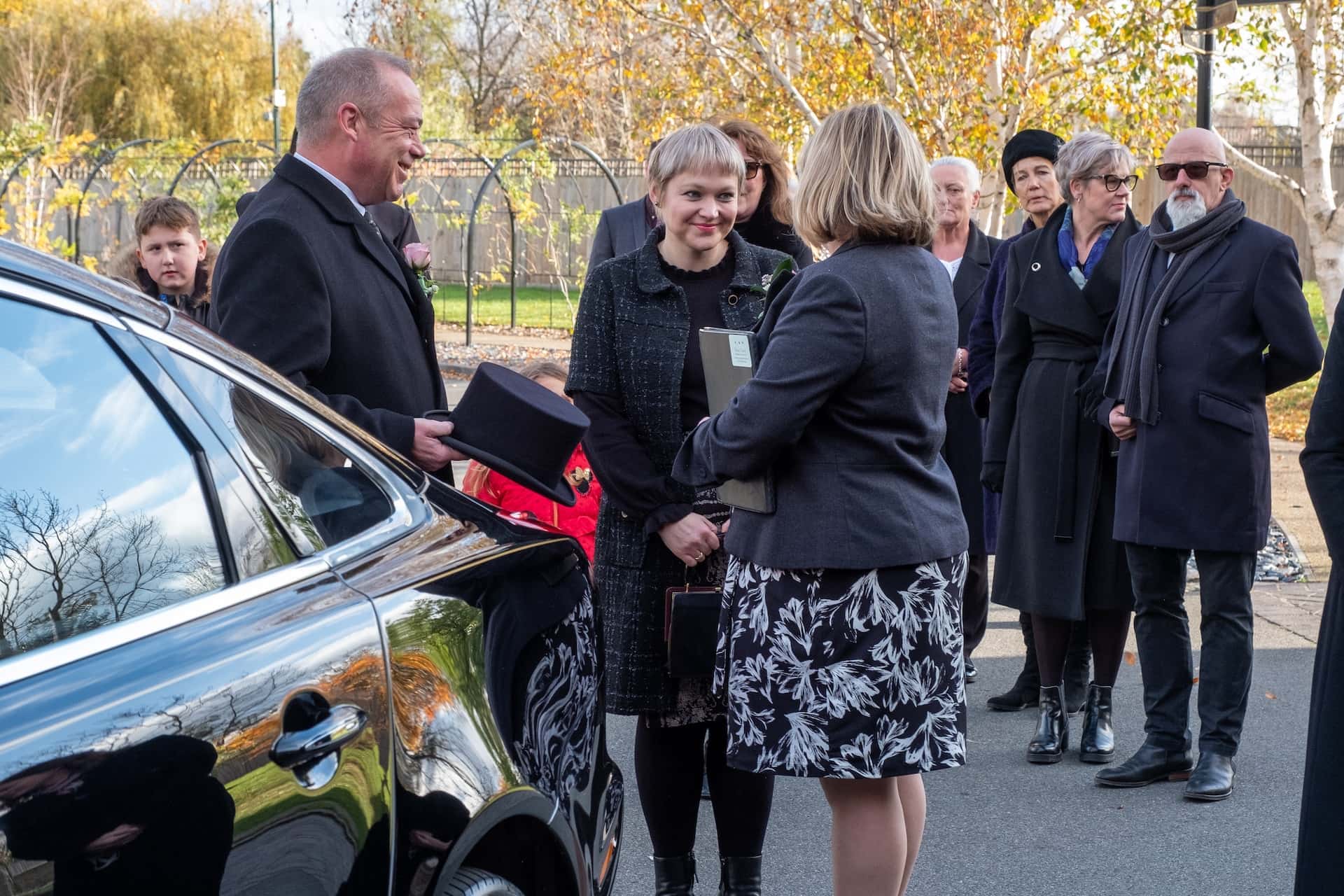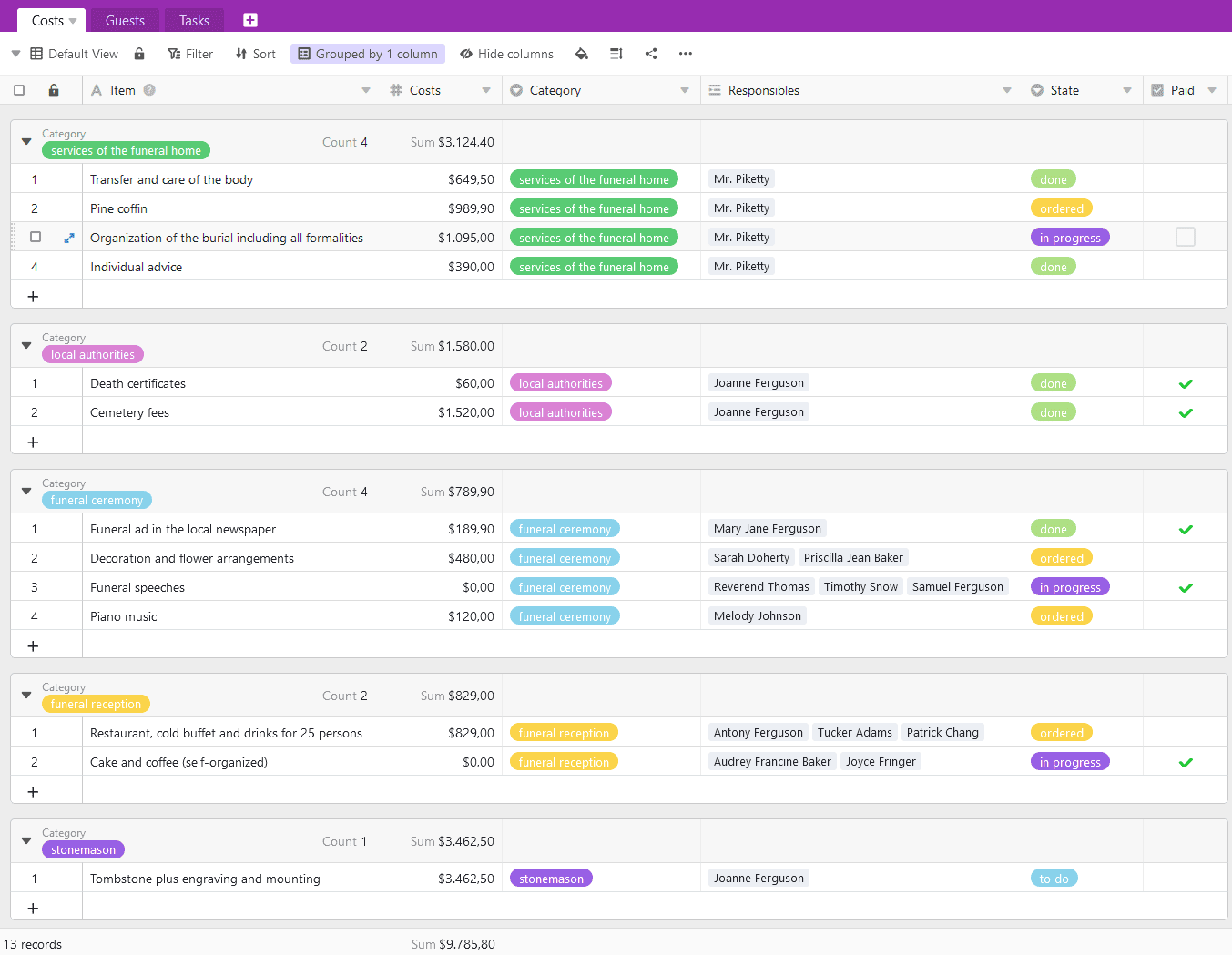Have you lost a loved one and want to get the upcoming funeral over with smoothly? Or you would like to plan your own funeral to relieve your relatives after your death? This article provides you with all the important information you need to know about organizing a funeral.
What is the cost of a funeral?
The cost of a funeral can vary from a few thousand to several tens of thousands of euros. An average funeral in Germany costs around 13,000 euros. You can find out where you can save on the costs in the article.
Where can you be buried?
In Germany, basically only two types of burial are permitted: burial in the ground and cremation. However, there are some places to choose from where the body or ashes can be buried. These include cemeteries, columbaria or selected areas in nature. You can learn more about this in the corresponding chapter.
What documents are needed for a funeral?
Among other things, you will need the identity card of the deceased, the birth and marriage certificates, as well as the death certificate and the death certificate. How to obtain these documents, you will also learn in the article.
Is it necessary to hire a mortician?
Yes. In Germany, the law stipulates that certain activities, such as the transfer of the body, may only be carried out by a mortician.
Who should you invite to the funeral?
You should inform everyone you care about the death of a loved one as soon as possible. This includes relatives, friends, acquaintances, neighbors and work colleagues. Whether you prefer to hold the funeral service in a small circle or invite the entire mourning community to the funeral via an obituary is up to you.
Good reasons to plan a funeral before death
The death of a loved one is associated with a great deal of grief for relatives. During this emotionally stressful time, many people do not find it easy to take care of the funeral. In the case of sudden deaths, the relatives often do not even know how the deceased would have imagined his or her own funeral.
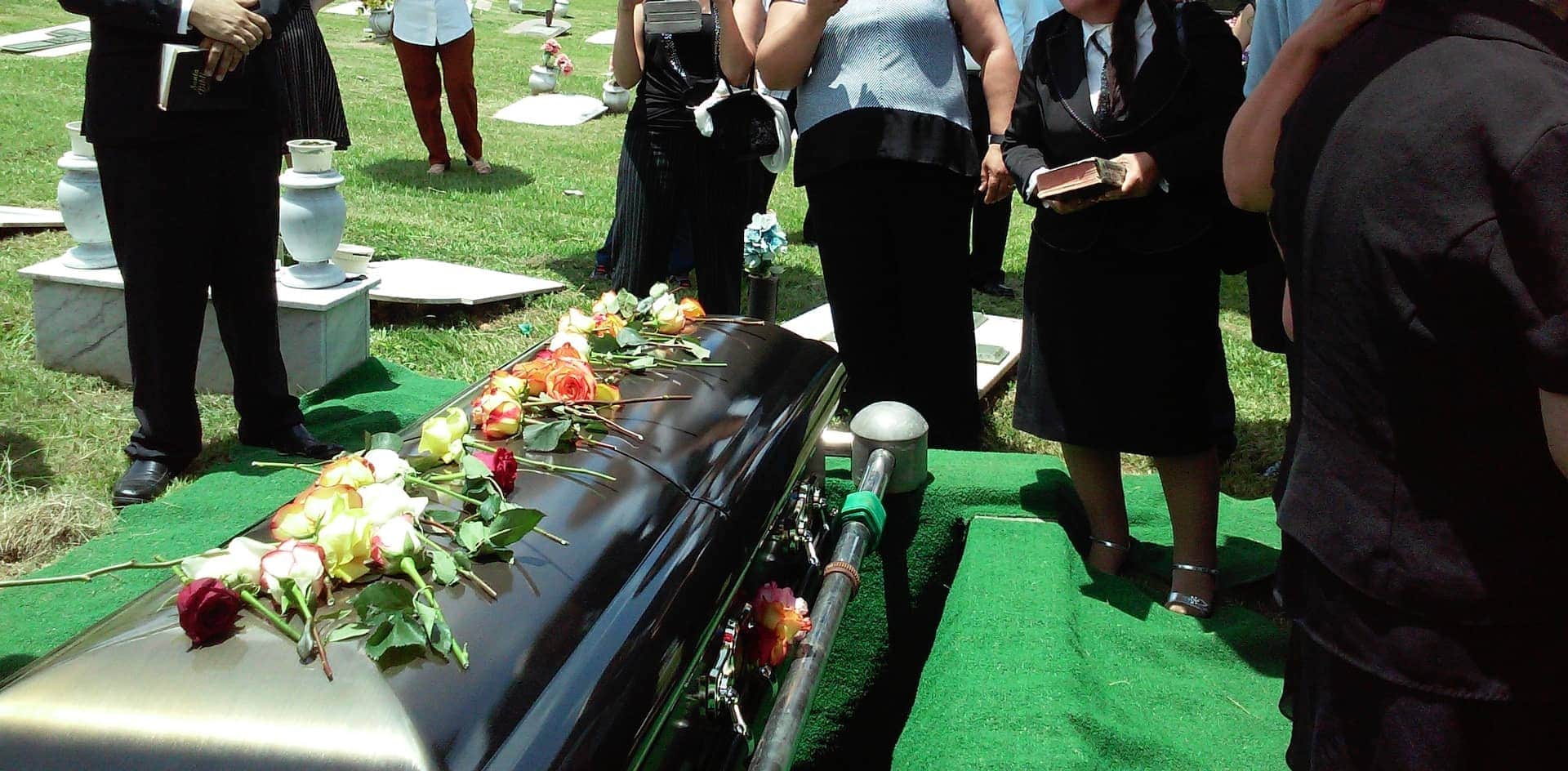
A traditional burial in a cemetery is still the first choice for many.
For this reason, you should talk openly with family and friends about the topics of death and funeral while you are still alive. In this way, you can not only express your own wishes, but also take note of the ideas of your relatives and prevent yourself from not fulfilling the wishes of the deceased person with the design of a funeral.
Determine responsible for the funeral
To avoid chaos in the event of death, you should clarify in advance who is to take care of the funeral and the handling of your legal transactions. Decide on one or more persons you trust. These can be close relatives such as spouses, children or siblings, but also close friends.

Planning a funeral - in an emergency, those affected often don't know what to start with.
To ensure that your funeral takes place exactly as you envision it, you should seek open discussion with those you trust and let them in on all your wishes. Early planning and financial provision on your part can greatly relieve the burden on your relatives. Not least because, in Germany, they are obliged to arrange an appropriate burial in accordance with the statutory care of the dead.
Choose burial type and place
The choice of a burial type is directly related to where you or the deceased person would like to be buried. This is the central decision that you must make. It is the basis for all further planning.
Types of burial permitted in Germany are:
- A classic burial in a cemetery
- A cremation followed by urn burial in the columbarium
- A cremation followed by a natural burial (e.g., in a resting forest or in designated areas at sea).
Perhaps there are relatives or friends next to whom you would like to find your final resting place? Then a communal grave could also be an option. Apart from cemeteries, alternative resting places in nature are now enjoying growing popularity.

A peaceful final resting place in nature is becoming increasingly popular.
However, burials are by no means permitted everywhere in Germany, but only in approved areas!
Talk to your loved ones about how they would like to remember you. After all, opinions vary widely on the question of how you would like to remember a loved one: some prefer a grave as a place of remembrance, some a personal object or photos as a memento of the deceased person; and still others do something every year on the anniversary of the death to remind them of the time they spent together.
Plan costs for the funeral
The costs of a funeral can vary greatly. This is because they depend, among other things, on the type of funeral, the design of the funeral service and the funeral director's individual prices. An average funeral in Germany costs around 13,000 euros. How expensive a funeral actually is, however, is up to you. Everything is possible, from a few thousand euros for an anonymous cremation to several tens of thousands of euros for a burial with a gravestone and a large funeral service.
The most expensive option is a traditional burial in a cemetery. A large part of the funeral costs is accounted for by the coffin, the gravestone and the user fees for a grave site. Each of these three cost items can amount to several thousand euros. You can save these costs - as well as the subsequent grave maintenance - with a cremation with natural burial.

Urn or coffin? The type of burial plays a major role in the cost of the grave.
The fees for a grave also vary depending on the cemetery, location and size of a grave. Even if you can make some adjustments, a funeral often means high costs for the relatives. Therefore, before you die, you should ideally save money that will cover the foreseeable costs of your wishes.
Obtain the documents for the funeral
In order for a deceased person to be buried, you will need the following documents, among others:
- Identity card
- Birth and marriage certificate
- Death certificate and death certificate
While people already have their identity card, birth certificate and marriage certificate during their lifetime, their relatives do not receive the death certificate and the death certificate until after their death. Usually, the process of obtaining the documents takes place in three steps:
- The death certificate is issued by the physician who performs the necropsy.
- The relatives must apply for the death certificate at the competent registry office as soon as they have the death certificate.
- Only when all the above documents are available, you can hire a funeral director to register and conduct the funeral.
You cannot spare your relatives this procedure, but you can deposit all other documents in a safe place. Likewise, you can regulate your last will and testament in a will that you deposit with the documents. As mentioned above, you should also think about a power of attorney for your trusted relatives. In addition, it may make sense for you to record your wishes for the funeral and funeral service in a burial directive. Be sure to tell the people you trust where these documents are located.
Hire a funeral home
In Germany, it is not possible to have a deceased person buried without a mortician. For example, in most federal states it is a legal requirement that the body must be transferred from the place of death to a mortician - and from there to the final resting place.
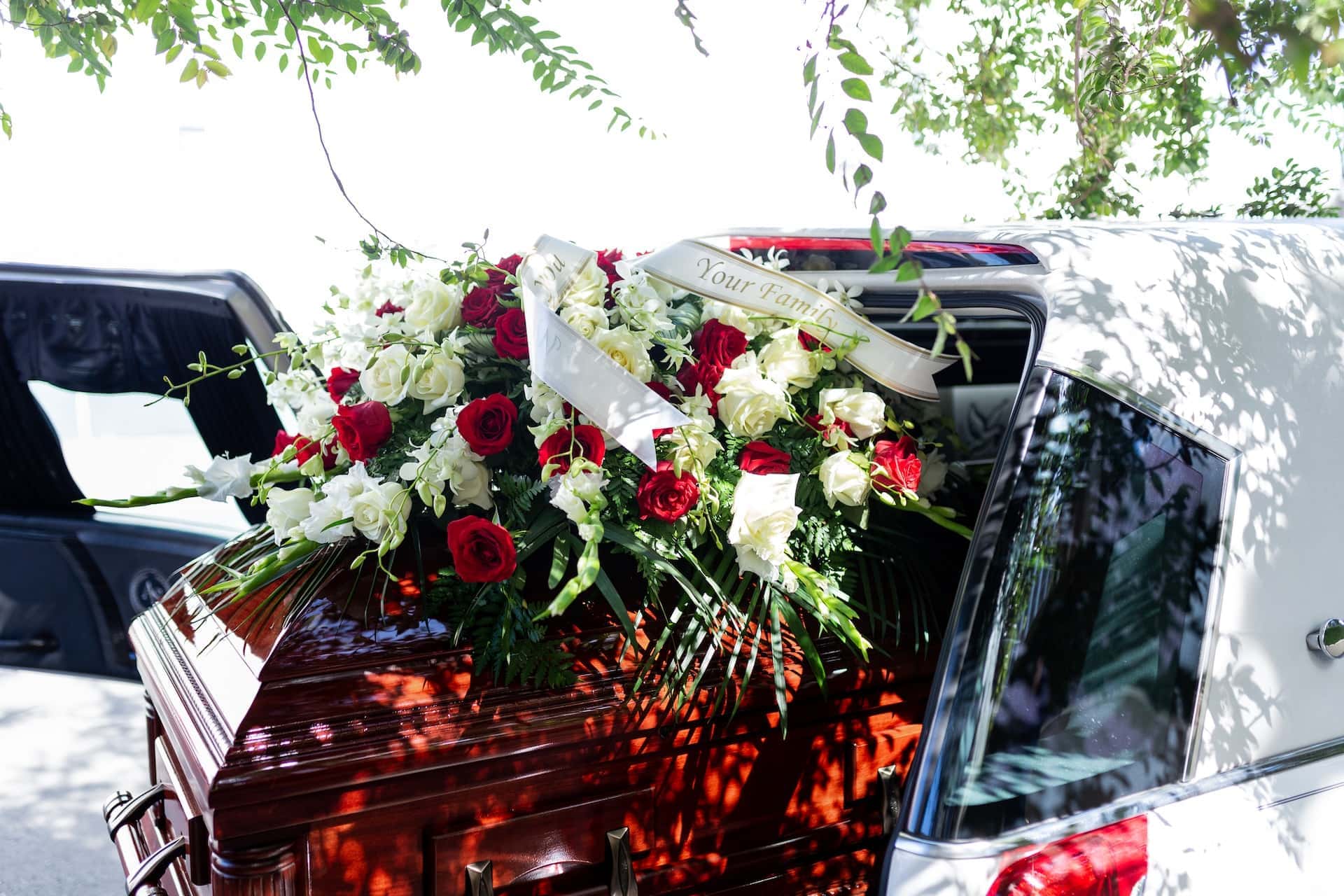
Other funeral services include:
- the care and/or cremation of the body
- the organization of the funeral including all formalities
- the procurement of coffin or urn
- individual services and advice
For the basic services of a funeral director alone, you should plan on at least 3,000 euros. Before you hire a funeral home, it is certainly worthwhile to obtain several quotes and compare them with each other. In the end, however, choose the funeral director with whom you have the best gut feeling. Nothing is more painful than an impious funeral director or a failed funeral for a loved one. In case of doubt, a dignified farewell should be more important than a few hundred euros more or less.
Plan the funeral service for the funeral
If the deceased person has expressed his or her wishes or put them in writing, all you have to do is implement the planning of the funeral service. If not, plan the funeral service in a way that you feel is closest to the person's wishes. If the person had been in a church or religious community, it may prescribe a certain ceremony for the funeral.
Hire funeral orator
Funeral services are usually accompanied by an independent speaker or a clergyman from the relevant church congregation. Contact a suitable funeral speaker at an early stage and talk to him about the course of the funeral service. Usually, he will address the life of the deceased person in his speech and requires detailed information and enough preparation time.
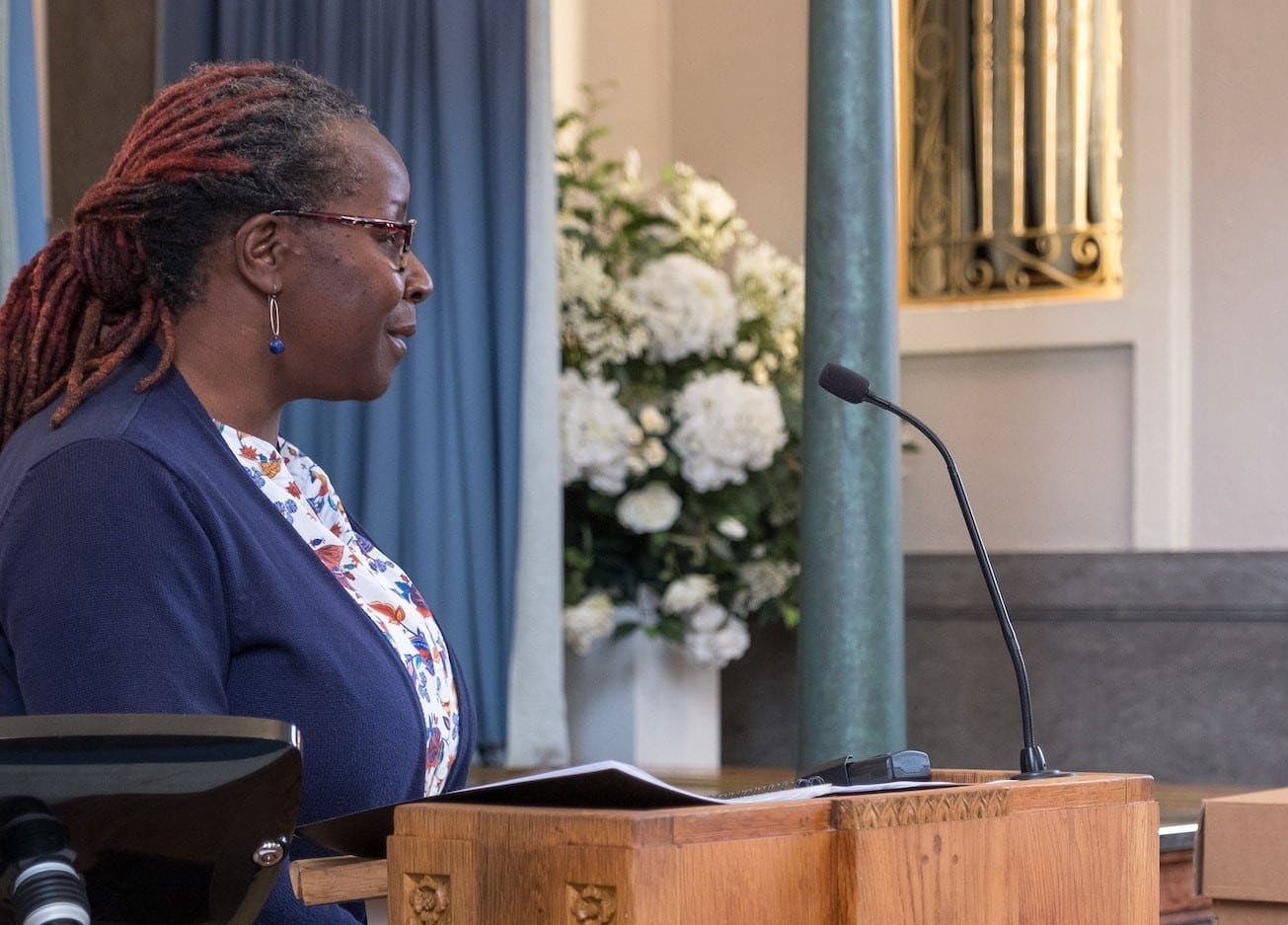
Priest, pastor or freelance speaker: what suits your planned funeral?
A clergyman usually holds the funeral service free of charge, whereas a freelance speaker receives a fee on an hourly basis. You can hire a professional speaker, who will design the funeral service individually with you, for as little as a few hundred euros.
Place and procedure of a funeral service
In most cases, a funeral service is held near the final resting place (e.g., at a cemetery) in a chapel or mourning hall before the funeral. However, you can also hold the funeral service independently of the actual burial, for example at the funeral home or at a completely different location. A funeral director usually has the appropriate contacts in his region to coordinate the use of the premises.
Ask the relatives in good time whether they would like to contribute actively to the funeral service. For example, they could say a few words to the deceased person or read a poem. Prayers can also be said at religious funeral services. Play music at the funeral service that the deceased person liked. Many funeral homes have good stereo systems or even a piano. If some relatives are musically and emotionally able, you can also play instruments and sing together.

Music and song can provide comfort at a funeral service.
The mourners often gather again after the funeral for a so-called funeral feast in a restaurant or café. This is particularly useful if many mourners have traveled from afar. If you would like to offer this, you should reserve tables in a restaurant well in advance and arrange the desired food and drinks with the host.
Funeral wreaths, flowers and decoration
At a funeral service followed by burial, the urn or coffin of the deceased is usually clearly visible in the room. Next to it, you can place a beautiful framed photo of the deceased person. So that the rest of the room does not look barren and empty, funeral wreaths and floral decorations are a good choice. You can hire a florist for the decoration, but this can be expensive, depending on your ideas.
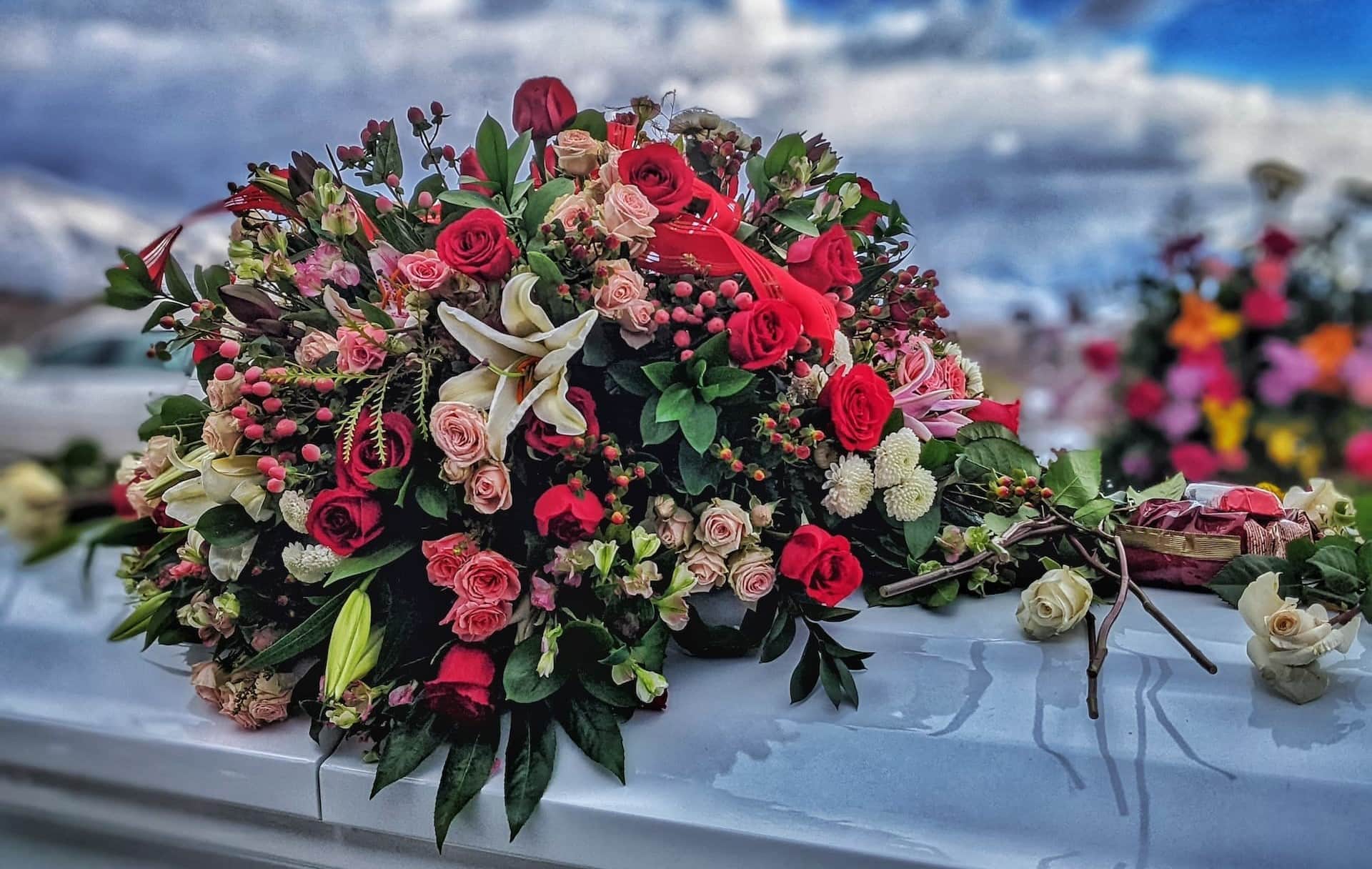
Often the other relatives participate very gladly in the procurement of funeral wreaths or flower arrangements and a respectable floral display comes together. If you want to plant a grave later, flower bowls with seedlings are a good idea. As a rule, the funeral director takes care of placing funeral wreaths and flower arrangements on the grave after the funeral service.
Mourning dress and atmosphere
Traditional mourning attire differs from culture to culture: In Europe and the Western world, black is the color of mourning, while in Asia it is primarily white - and elsewhere it may even be colorful. In Germany today, the clothing at a funeral no longer has to be black, but discreet clothing in muted colors and loose cuts is often expected - for example, a dark blue suit with a white shirt, a plain-colored sweater with black pants, or a dress that is not too tight and does not show too much skin.
However, mourning attire is not a must. Unconventional or cheerful funeral ceremonies are also permitted if the deceased wished for people to celebrate him and his life instead of mourning. So plan the funeral service detached from traditions and entirely according to the wishes of the deceased.
Death notice and invitation of the mourners
You should inform everyone you care about the death of a loved one as soon as possible. This includes relatives, friends, acquaintances, neighbors and work colleagues. It is best to make a list of all the relevant people and contact them even before you have clarified the details of the funeral service. This gives all relatives the opportunity to process the death and, if necessary, request special leave.
For the notification of the mourners, you ideally have access to a contact list in the cell phone or e-mail account of the deceased. If you know the deceased's environment very well, you can also make a note of the people from memory and find out their contact details. If the deceased person was active on social media, you can write to contacts there.
Once you have planned the date and place of the funeral service, you can also place a death notice in a local newspaper inviting people to the funeral service. If it is held in a public place such as a cemetery, anyone who has received the information may attend the funeral service. However, you can ask the mourners to refrain from expressing condolences on the spot.

Older people in particular often still read obituaries in local newspapers.
If the funeral service is to be held only in the closest circle, do not write a date in the obituary so that really only the invited persons attend. You should invite the deceased's most important caregivers personally anyway - and ideally a week before the funeral service. This way, you ensure that everyone receives the news in time and has a chance to say goodbye to the deceased.
Funeral checklist and online planner
With everything you need to plan for a funeral, it's easy to lose track of everything. SeaTable has therefore compiled the most important to-dos for you in a checklist. You can also use the online planner to coordinate the invitation of the mourners or to calculate the costs for the funeral.
If you want to use SeaTable to organize a funeral, simply register for free and create an overview with your own data. You can find the corresponding template here.
